In this article:
A head full of healthy hair is often perceived as a symbol of good health, personality, and appearance, making it a desirable feature. However, it is common to face hair loss problems, which often become a source of worry.
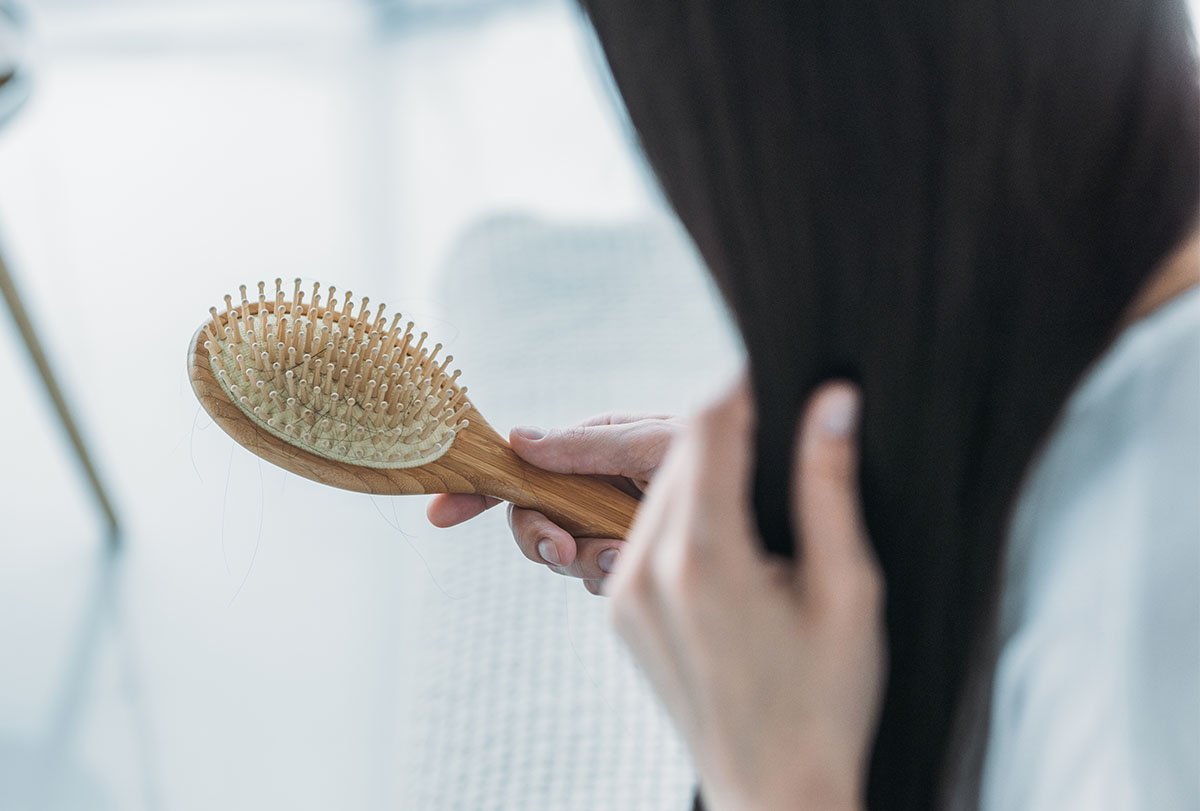
Hair fall can occur due to a variety of reasons, including age and genetics. It can have a sudden onset, frequently because of shock or trauma. Your lifestyle factors, such as smoking, hair care routine, diet, use of hairstyling tools, and stress, can also contribute to hair loss.
In other cases, hair fall may start gradually due to medical conditions such as a thyroid problem, (1) hormonal imbalance, polycystic ovarian syndrome, telogen effluvium, alopecia areata, (2) and nutritional deficiencies.
You can often manage hair loss with simple self-care measures and home remedies. It is also advised to consult a doctor for different hair loss treatments if the problem is severe, especially if an underlying medical problem is involved.
Home Remedies to Reduce Hair Fall
The following self-care tips and at-home remedies can help lower hair fall:
1. Select suitable natural hair products
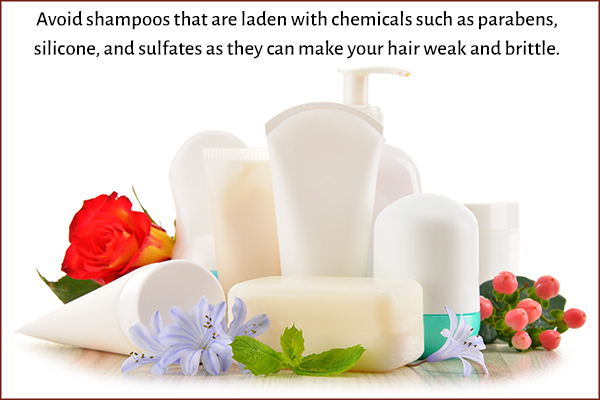
Make sure to select hair products, such as your shampoo and conditioner, according to your scalp type and requirements. Avoid shampoos that are laden with chemicals such as parabens, silicone, and sulfates as these can make your hair weak and brittle.
It is vital to use a conditioner as it helps moisturize, strengthen, and smoothen the hair. The amino acids in conditioners help reverse hair damage, thus preventing hair fall.
2. Avoid heat tools and chemical treatments
Subjecting your hair to chemical-based treatments such as perming and hair coloring can damage your hair in the long run. (6) This also holds true for the regular use of curling rods, blow-dryers, and straighteners, especially on wet hair. The heat from these tools can make your hair brittle.
If you do have to use heat styling tools, make sure to use a leave-in conditioner and a heat protectant spray first. Moreover, use a blow-dryer in its lowest heat setting.
3. Perform a hot oil massage
Massaging your hair with oils is a vital step in any hair care routine. It not only helps nourish the hair, boosting hair growth from the roots to the tip, but it also contributes to improved hair strength and shine. (7)
Heat amla, olive, coconut, mustard, argan, or almond oil slightly and apply it to the scalp. Massage with your fingertips for a few minutes, and leave it on for 2–3 hours or overnight before washing. This practice stimulates blood flow to the hair follicles, thus improving the supply of nutrients and oxygen. Moreover, hair massage conditions the scalp, strengthens the roots, and relieves stress. (8)
You can also add essential oils to the carrier oils for added benefits, including rosemary, lavender, tea tree, cedarwood, and peppermint (9) essential oils.
4. Apply a coconut-onion hair mask
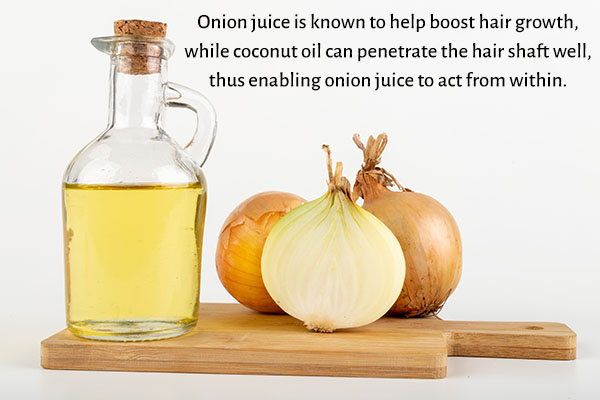
Onion juice is known to boost hair growth, owing to its sulfur content that nourishes the hair follicles, thereby improving hair thinning and breakage. Moreover, it stimulates the production of the antioxidant compound called catalase.
Coconut oil is a potent antibacterial agent, and it nourishes and moisturizes the hair as well. Additionally, it can penetrate the hair shaft well, thus enabling the onion juice to act from within.
How to use:
- Mix 2 tbsp each of coconut oil and onion juice.
- Add 2–3 drops of tea tree essential oil to it.
- Apply the solution to your scalp and massage it for a few minutes.
- Wash your hair using a mild shampoo after 30 minutes.
5. Use natural hair masks
You can use hair masks made of natural ingredients to boost hair growth and nourish your hair with vitamins, proteins, and antioxidants. You may use yogurt, fenugreek seeds, (10) amla, eggs, (11) curry leaves, and aloe vera.
How to use:
- Mix any of the above-mentioned natural ingredients with olive oil, coconut oil, or almond oil to form a paste.
- Apply the paste to your hair.
- Rinse your hair after 1–2 hours.
6. Avoid tight hairstyles
It is suggested to select natural hairstyles that leave your hair loose, allowing your scalp to breathe. Wearing your hair in tight hairstyles, such as braids and ponytails, can contribute to increased hair fall.
It is also vital to take proper care of your hair after styling to prevent damage and hair fall. Moreover, get your hair trimmed every few months to prevent damaged ends.
7. Do not brush wet hair
Hair is at its weakest when wet. Therefore, brushing your hair when it is wet can increase the chances of losing more hair.
If you do have to brush wet hair, make sure to use a wide-toothed comb. Avoid pulling at your hair, and untangle the strands gently. It is also advised to avoid combing your hair frequently as it can damage the hair shaft, leading to increased hair loss.
8. Avoid hot water baths
Strictly avoid washing your hair with hot water as it can damage the hair, lighten its color, and overstimulate oil production. Instead, use lukewarm water to improve blood circulation and to limit the activity of the oil glands.
9. Manage your stress
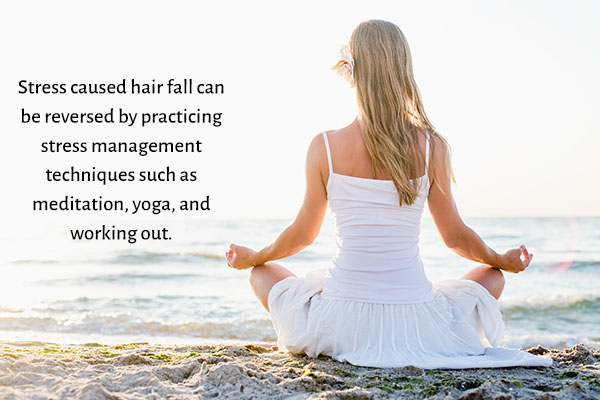
Stress is a major contributor to hair fall by increasing cortisol and epinephrine in the blood, interfering with the hair growth cycle, often leading to premature graying. Moreover, hair fall can often cause stress, leading to an endless cycle. Therefore, it is vital to not stress over hair fall.
Stress-caused hair fall can be reversed by practicing stress management techniques such as meditation, yoga, and working out.
10. Improve your hormone balance
Hormonal imbalance, such as increased levels of testosterone and dihydrotestosterone, can cause hair fall as hair follicles are sensitive to the levels of these hormones. Hormonal imbalance is a very common reason for hair fall. (12)(13)
Such an imbalance can be due to pregnancy, thyroid problems, and polycystic ovary disease (PCOD). It is recommended to exercise regularly and consult your doctor for proper treatment.
11. Stay hydrated
Maintaining optimum body hydration levels is important to maintain the health of hair cells, thus preventing hair loss. Drink plenty of water and include foods with high water content in your diet.
12. Consume a proper diet
Hair fall can also occur due to nutritional deficiencies such as a lack of protein, iron, and vitamin B. It is this important to consume a balanced diet to provide proper nourishment to your hair and strengthen it.
Include the following in your diet to induce hair growth and manage hair fall:
- Consume green vegetables. Eating greens such as gooseberry, guava, and spinach provides your hair with iron, protein, and zinc. Doing so also helps control hair fall and boosts hair growth.
- Include amino acids in the diet. Dairy products, nuts, and red meats are rich in arginine, an amino acid that supports hair growth. You can also consume seafood and dairy for their high amounts of lysine, which boosts collagen production and thus makes the hair strong and healthy.
- Eat antioxidant-rich foods. Antioxidant-containing foods such as avocados, bananas, lemon, orange, and honey fight free radicals in the body. You can also use these fruits topically to help boost hair growth.
13. Avoid smoking
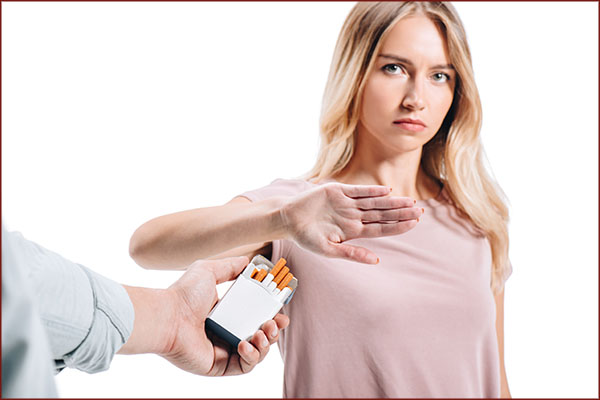
Cigarettes contain toxic chemicals that can shrink your blood vessels, thus limiting blood circulation to the hair follicles. This, in turn, decreases the supply of nutrients and oxygen, thus inhibiting the hair growth cycle and causing hair loss. Stay away from cigarette smoke, and limit your alcohol consumption.
Treatments to Curb Hair Fall

Your dermatologist may recommend the following treatments for hair fall:
- Minoxidil: Minoxidil is an FDA-approved drug that boosts hair growth and prevents hair thinning for both genders when used regularly. (3) It is available in liquid and spray forms to be applied to the scalp twice a day.
- Finasteride: Finasteride is another FDA-approved drug used to improve hair loss in men. In one study, this treatment was shown to retard the hair loss rate in 88% of men and stimulate new hair growth in around 66% of men. (4)
- Corticosteroid: Injecting corticosteroids into the scalp can alleviate inflammation and treat alopecia areata.
- Hair transplantation: This surgical procedure involves implanting hair from a strip of skin or directly implanting hair follicles from the back of the scalp to the affected area where hair growth is required.
- Scalp reduction: In this procedure, the bald areas of the scalp are removed and are then covered by the surrounding, loosened scalp that has hair growth.
- Intensive hair root therapy: This treatment involves micro-injections that contain vitamins, plant extracts, and nutrient cocktails to prevent hair thinning and loss and to stimulate further hair growth.
- PRP hair rejuvenation: This FDA-approved minimally invasive procedure involves injecting your own plasma, which is rich in growth factors and nutrients, into the scalp to improve hair follicle health. (5)
- Scalp expansion: Devices are put under the scalp to stretch the skin and thereby expand the skin with hair to reduce balding.
- Scalp flaps: A fertile area of the scalp is surgically removed and placed on the balding areas.
- Laser treatment: Laser treatment stimulates blood flow to the scalp and boosts metabolism in the hair follicles. This is performed using low-level laser lights that are absorbed by the weak cells in order to regain strength.
Final Word
It is normal to lose a few strands of your hair every day, but excessive hair fall can be a problem. Consult your dermatologist for the proper diagnosis and treatment.
Moreover, using self-care remedies and improving your hair care routine can help prevent hair fall, improve your hair health, and boost healthy hair growth. Make sure to act on the problem of hair fall timely, as it can worsen with time and can lead to permanent baldness.
- Was this article helpful?
- YES, THANKS!NOT REALLY


